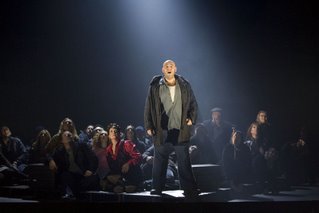|
Editorial Board
Melanie
Eskenazi
Webmaster: Len Mullenger
|
Seen and Heard Opera Review Opera
North On Tour:
The Lowry Theatre,
The second offering of the touring season is Phyllida Lloyd’s production of Peter Grimes. It is a bleak story of the small mindedness of parochial villagers and their treatment of an over authoritarian fisherman who has the misfortune to have two of his apprentices die in accidents in a high-risk job. If the story is bleak, Anthony Ward’s sets in this production are even more so; they provide the backdrop of the story in the starkest and most dramatic terms.
There is neither pub nor
Grimes’ hut in this production and only a large cross represents the church.
A larger suspended fishing net serves as the focus of
the occupational activities of the village in two scenes
and with the exception of the construction of a platform to represent
the hut, all the other props are simple black painted
palettes carried on and off by the singers and chorus
and used to represent structures. Such sparseness puts
pressure on the producer, soloists and chorus to fill
out the story in a meaningful manner but in fifty years of
opera going I have rarely seen this achieved
so successfully with so little stage furniture. The orchestral playing under opera North’s Music Director, Richard Farnes, and the solo performances are a perfect complement to the production, sets and choral singing. Britten’s evocative orchestral interludes are played with appropriate drama and emotional feeling. During the interludes, Phyllida Lloyd’s visual imaging is foolproof, none more so than when Grimes lifts the latest of his dead apprentices, carries him to the footlights and then lifts him above his head in mental agony in the Moonlight interlude. For this to be realistic the tenor singing Grimes has to have physical as well as vocal strength.
Although Jeffrey Lloyd-Roberts is a big man physically his
tenor voice is relatively small and tightly focussed.
None the less he can and does sing with great variety
of expression, colour and variation of dynamic. With
shaven head and fishing waders this Grimes looks a bit
thuggish and makes one wonder what Ellen sees in him,
especially as he becomes more psychologically disturbed,
a state of emotional deterioration that Lloyd-Roberts
portrays to perfection. Giselle Allen sings strongly
as Ellen but with too little clarity of diction, which
is a particular strength of the strong singing and sympathetic
portrayal of Balstrode by Christopher Purves. Yvonne Howard (Auntie) sings with clarity and strength
although what she was supposed to be doing as the villagers
partied I had better not inquire too much about. This
scene was really the only representation that Britten
might not have recognised from his
The third offering in this tour Poulenc’s monologue for solo singer La voix
humaine. Premiered in
1959, it is in modernist compositional style with strident
orchestral accompaniment to the fraught psychological
state of The Woman. Psychological states seem to be
the subtext of this Opera North season with Rigoletto
rejected by his deformity, Grimes for his social non-conformity
and The Woman by her man ; or was her neuroticism the
cause or the effect? Deborah Warner’s production, interpreted
by Joan Rodgers, leaves little doubt. Forty five minutes
on the telephone to her man, without frequent cut-offs
leaves her gagging into the bidet. Her more psychotic
episodes are accentuated by lights flashing onto a ceiling
screen to coordinate with the heavy orchestration at
these points. Apart from the light bank, the set comprised
The Woman’s bed, a washstand, WC and bath as well as
the bidet; rather excessive to the needs! Joan Rodgers’
sung and acted performance of this rather shabby story
is outstanding and deserved a far larger audience than
it got.
Opera North return to The Lowry on February 21st 2007
for their spring tour with revivals of Donizetti’s lyrical
love story The Elixir of Love, Mozart’s ever
popular Magic Flute and a new production of Claudio
Monteverdi’s seminal Orfeo by the American Christopher
Alden. The tour also takes in
Back to the Top Back to the Index Page |
| ||
|
||||




